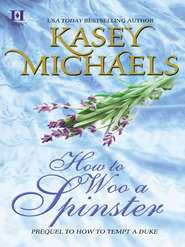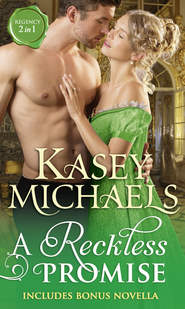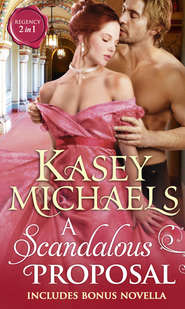По всем вопросам обращайтесь на: info@litportal.ru
(©) 2003-2025.
✖
The Secrets of the Heart
Автор
Год написания книги
2018
Настройки чтения
Размер шрифта
Высота строк
Поля
Lord Byron
LADY ARIANA TREDWAY DID her best to put a bright face on her position of Baron St. Clair’s second choice as he whirled her around the dance floor, listening to his inane but amusingly risque chatter concerning a certain peer recently winged in the buttocks by his pistol-waving wife, the silly man having been discovered in flagrante delicto in his own library with a certain fast matron.
St. Clair was such a fool, but a powerful fool, and Lady Ariana hated him for his slight defection from her side in this, her second Season, as greatly as she adored him for having deigned to speak with her at all.
It was silly to have such a brainless popinjay as the arbiter of every step Society took, every stitch they wore, as all of Society was silly, but it was the way of the world, and Lady Ariana accepted it as thoroughly as she accepted the fact that she was the most beautiful woman to grace Mayfair in decades.
And Lady Ariana was not entirely conceited in her determination of that beauty. Her hair was soft blond, a most necessary color for a young lady wishing to be thought of as a true English beauty, and her china-blue eyes were the envy of two Seasons of hopeful debutantes. Her petite form provided an added fillip, as did her softly rounded curves, straight white teeth, and a sulky mouth that owed none of its deep pink color to the paint pots many misses were forced to use.
She was known all through Mayfair as the young lady who had in the past year turned away the suits of no less than two marquises, a truly lovestruck earl, and one Honorable whose fortune was favorably compared with that of Golden Ball himself.
She was pampered and petted by her powerful Tory father, indulged by her rather plain mama who in these past twenty years had still not quite moved beyond her gratitude that the Fates had blessed her with such a comely daughter, and sought after by all who would be invited to the best parties.
Indeed, in the insular, almost incestuous twelve hundred or so souls that made up the cr?me de la cr?me of English Society, Lady Ariana Tredway had, just this past Season, shared the premier social pivot with only Baron Christian St. Clair.
Until this new Season, that is, when that same socially powerful Baron St. Clair had taken it into his silly head to champion Gabrielle Laurence. No wonder Lady Ariana despised the chit without having spoken more than a half dozen words to her.
“Christian?” Lady Ariana chirped, hoping to gain his full attention. She addressed the baron informally, as their acquaintance had progressed to that point, if no further—for everyone knew the young lady was hanging out for a duke and was written up in the betting book at White’s as being certain to snag one this Season.
Besides, as everyone also knew, Baron Christian St. Clair remained uninterested in females other than to squire them on the dance floor, and Lady Ariana Tredway was much too intrigued with herself and her ambitions to care overmuch for anyone else. “Must you persist in teasing that poor Laurence girl so horribly? You’ve been at it for nearly a fortnight, and it’s thoroughly embarrassing to watch.”
St. Clair raised one eloquent eyebrow and stared at her just as if he hasn’t understood her. “Teasing, Ariana? Sacrеe tonnerre! Whatever do you mean?”
“Oh, stop it, Christian. You know very well what I mean,” she said, pulling away from him so that he had no choice but to follow her off the dance floor or remain standing there, abandoned. “You are only puffing her up in order to prick her soundly, deflating her consequence in an instant. I believe you to be very mean in this, which is not at all like you. Usually you are droll and amusing, not brutal.”
“Mon dieu, has it come to this?” St. Clair clucked his tongue as he stepped in front of her, halting her progress. “You’ve gone and had a thought, haven’t you, Ariana? How very bad of you. And it will cause lines in that lovely forehead if you are not careful. Can’t get a duke with wrinkles. Of course, as I understand the duke of Glynnon was seen waltzing with Miss Laurence earlier this evening, you might be worrying yourself needlessly, your hopes already dashed.”
“Don’t avoid my question, Christian,” Lady Ariana countered, bristling at the baron’s deliberate dig and pointedly looking past him, yet only vaguely noticing a commotion to her left, at the doorway to the ballroom. “You took one peep at that dowerless girl—her father gambles, or so Papa says—and immediately decided you could not like her. I agree she is presumptuous, believing she could sweep into Mayfair and conquer us all, but is it really necessary to humiliate her?”
“Au contraire, my dear. You couldn’t care less that I have the power to destroy the fair Laurence. What you are really asking, I fear, is when I will bring her down,” St. Clair responded amicably, lifting his handkerchief to the corner of his smiling mouth. “Leaving you, I presume, free to once more reign as the toast of London. I may be dim, but I can see where this conversation is heading and want no part of it. If you dislike Miss Laurence, cut her yourself, and see if your consequence is up to the challenge. But please, save me from these female machinations. I am only a simple man acting out of charity, totally devoid of intrigue, and I dislike your insinuations intensely. Why, if you two beautiful young ladies were to descend into a catfight I would doubtless be forced to cut you both and take up another cause, another delightful creature whom I would then instantly catapult to social success.”
Lady Ariana was stung into replying without first measuring her words. “I believe I might be better served to join forces with Miss Laurence and see if we couldn’t discover some way to put you out of favor, Christian.”
St. Clair’s shrug was entirely French, for if he was every drop the Englishman, he had spent the years following Waterloo enjoying Parisian society, obviously taking on some of their more eloquent mannerisms, even to the point of sprinkling his conversation with snippets of not necessarily germane French.
“If you must, my dear,” he returned affably. “I am naught but a momentary whim, like poor Brummell before me, and exist merely at the pleasure of Society. But, then, as I recall, it took both Prinny and a year’s long disastrous run at the tables to bring Beau down. Do you believe you and Miss Laurence to be capable of a similar feat?”
Lady Ariana looked closely into St. Clair’s now deeply blue eyes and wished herself out of this potentially dangerous conversation, which she had only entered into because she was upset at the man’s attention to the Laurence chit. She was within a heartbeat of going too far with the usually affable baron, and she decided to pull back.
“Forgive me, Christian,” she said, smiling apologetically. “I have barely eaten all day in order to be certain the line of my gown would be as you desire it. I am all out of sorts tonight, I suppose.”
Then she turned toward the doorway and the sound of raised voices that had momentarily ceased but had now begun again. “Christian? Do you think something is wrong?” she asked, gesturing toward the doorway with her fan.
St. Clair turned and lifted his stemmed quizzing glass to his eye. “How fatiguing. I’ve heard less ruckus in a fish market. Not that I’ve ever visited any such establishment, but I have heard stories, you understand. Comment—do you suppose the place has caught on fire? That is what will come of layering the place with bunting. Come, we will make our escape.”
St. Clair offered Lady Ariana his arm and they made their way toward the main doorway, becoming part of the throng of partygoers now congregating there. He stopped just beside the equally tall but darkly handsome Lord Anthony Buxley, who, Lady Ariana was depressed to see, had the opportunistic Miss Gabrielle Laurence hanging from his sober midnight-blue sleeve.
Almost immediately, seeing that the four purest diamonds of society were in their midst, several people politely gave way, until the quartet of exquisites had a clear view of what was transpiring in the hallway just outside the ballroom.
“And I’m telling you, Undercliff,” a red-faced, corpulent man of at least fifty was informing their host, “I don’t give a bloody damn if you’ve got the bleeding king inside. I swear it, the Peacock’s come to Little Pillington. We have to talk, Undercliff! Now!”
“Good Lord, Miss Laurence,” Lord Buxley declared clearly above the sly titterings of the onlookers, trying to draw his companion from the scene, “it’s naught but some importuning tradesman. Come away and we’ll go down to dinner before all the best tables are taken. There’s nothing here of interest.”
Miss Laurence, however, appeared to have no intention of removing herself from the inquisitive throng. “What would his lordship have to do with a tradesman? And didn’t the man say something about the Peacock?” she asked Lord Buxley, whose good manners obviously forbade him from deserting the scene in favor of the summer rooms, a bolt hole that seemed to appeal to him very much more than continuing to be in such close proximity to Lord Undercliff and his loud, crude, uninvited guest.
“Please, Miss Laurence,” Lord Buxley repeated quietly, looking to Lady Ariana, who believed she interpreted his glance correctly, and he wanted nothing more than to be shed of the situation. She felt much the same herself. No wonder her papa spoke so highly of the man. Pity he wasn’t a duke, for she had set her cap for a duke and would not settle for less.
“Why, my lord?” Miss Laurence persisted with, to Lady Ariana’s mind, no more intelligence than she expected of the young woman. After all, hair that red was bound to have singed the girl’s brain. “All I asked was what the man might have to do with Lord Undercliff.”
“What would his high-and-mighty lordship have to do with me?” Herbert Symington all but shouted, having heard Gabrielle’s artless question in the silence that had immediately followed St. Clair’s polite, suggestive clearing of his throat.
Symington took two steps forward, showing all intentions of not stopping until he was nose to nose with the curious beauty, and said, “We’re partners in business, Undercliff and me, little missy, even if he don’t want anyone to know it. Partners in the Symington weaving mills, in Little Pillington.”
A ripple of excitement, of disgust, of amused understanding, ran through the crowd of peers who considered any endeavor even vaguely related to trade to be a sin on a par with treason or even incest—although those two transgressions could be excused if there existed ample motive for either profit or personal satisfaction.
But to descend to trade! It was the outside of enough, completely beyond the pale, as poor Lady Undercliff immediately proved by fainting dead away in Lord Buxley’s reluctant arms.
Lady Ariana, sensing a golden opportunity to show Miss Laurence in an ill light, snapped open her ivory-sticked fan and began waving it as she pronounced clearly, “I should hope you’re happy now, Miss Laurence. Thanks to your unseemly curiosity, poor Lady Undercliff has swooned in embarrassment. St. Clair, be a dear and assist me in extricating myself from this sad crush of titillation-seeking nosey-parkers.”
Now, she then thought, inwardly preening as she looked to the frowning baron. You have no choice, St. Clair, but to cut her now!
Lady Ariana held her breath. She could feel the hesitancy and indecision that held the remainder of the partygoers frozen in place, awaiting St. Clair’s decision as to the correctness of their presence at Lord Undercliff’s social destruction. By simply turning his back the baron could destroy the Undercliffs, and Miss Gabrielle Laurence as well.
St. Clair lifted his quizzing glass once more, leisurely surveying the multitude, hesitating as his gaze took in the puce-faced Herbert Symington, the visibly quavering Lord Undercliff, and the obviously unconscious Lady Undercliff.
“Tiens! Do I detect a want of steadiness in our small group, an unwillingness to act? Very well,” he then drawled affably, “as it would appear it is left to me to take charge, I will. Lord Buxley, I commend you on your timely capture of our dearest hostess in her time of need. Perhaps you will now retire and give her over to the servants—with Lady Ariana’s assistance, as she considers herself too angelically pure for such goings-on as we are witnessing—while we vile, despicable souls remain riveted here at gossip’s head table, ravenous for sensation and unabashedly avid to lap up any drop of scandal. After all,” he continued, allowing the quizzing glass to drop, “as some observant wit has written, ‘Society in shipwreck is a solace to us all.’”
Lady Ariana winced as the shaft of St. Clair’s verbal arrow unexpectedly sank home in her chest. He had not cut Gabrielle Laurence. He had turned the weapon of his tongue on her instead, damning her with faint praise, calling her angelic when what he’d really meant was that she was a stiff-backed prude who had not insulted just Miss Laurence but all these several dozen milling people who were eager to witness Lord Undercliff’s very public embarrassment.
“Christian,” she began, squeezing his arm as she looked up at him, “please—”
“Tut, tut, my dear,” he broke in as two footmen came to Lord Buxley’s aid, taking the slowly recovering but still unsteady-on-her-feet Lady Undercliff away, “don’t say another word. We are all human, and therefore we all understand. Of course you may remain—you and Lord Buxley both. I know I could not leave now, even if I shall most sincerely hate myself in the morning—as we shall all most sincerely berate ourselves for our eagerness to hear what Mr. Simons here has to say.”
“That’s Symington, my lord,” Herbert Symington broke in rather rudely even as Lord Buxley, known far and wide as a true stickler for the conventions, sharply turned on his heel and strode away.
Lady Ariana didn’t know which of the two gentlemen she disliked more at that moment: Christian St. Clair for forgiving her, or Lord Anthony Buxley for having the courage to defy the man. Lord Buxley, probably, for now the smiling Miss Laurence and her most annoying, vulgar beauty mark were standing directly beside the baron, basking in the glow of his approval.
“Symington, you say?” St. Clair inquired casually, again employing his quizzing glass to great effect as he inspected the mill owner from head to toe, but quickly, as if the sight of the man’s poorly cut brown jacket and too-tight breeches were offensive to his sensibilities.
“La, sir,” the baron continued, “I can’t imagine why you have taken it into your head to believe I care either way what name you give to yourself. But, please, we are most avidly interested in what you have to say, as it is obvious you are operating under some sort of strain. You look, to be frank, as if you have just recently been ridden hard, and then put away wet. Not that such things matter in light of other, more interesting gossip. Miss Laurence here, for one, appears to be eager for news of the Peacock. Whatever has that terrible, terribly exciting creature done this time?”
And now, at last, Lady Ariana understood. How could she have been so stupid? The baron was attempting to protect Lord Undercliff, his inquiry deliberately bypassing Undercliff’s association with Symington to concentrate on the much more provocative subject of the Peacock.
And the rest of the evening’s guests also understood and would not speak publicly of Lord Undercliff’s acute embarrassment, knowing St. Clair would not be best pleased if they did so. Oh, he was clever, Christian St. Clair was, earning himself the powerful Lord Undercliff’s undying gratitude while still indulging Society’s appetite for scandal. Everyone was happy. Everyone save Lady Ariana, and Herbert Symington.
“What did he do?” Symington bellowed, causing Lady Ariana to bring herself back to attention after indulging herself in a lesson on how St. Clair’s mind worked. “I’ll tell you what the Peacock did. Just tonight he robbed me of my new coach and then burned my new house straight down to the ground!”
“’Tare an’ hounds! Another house? That’s the second this month,” someone behind Lady Ariana exclaimed.











